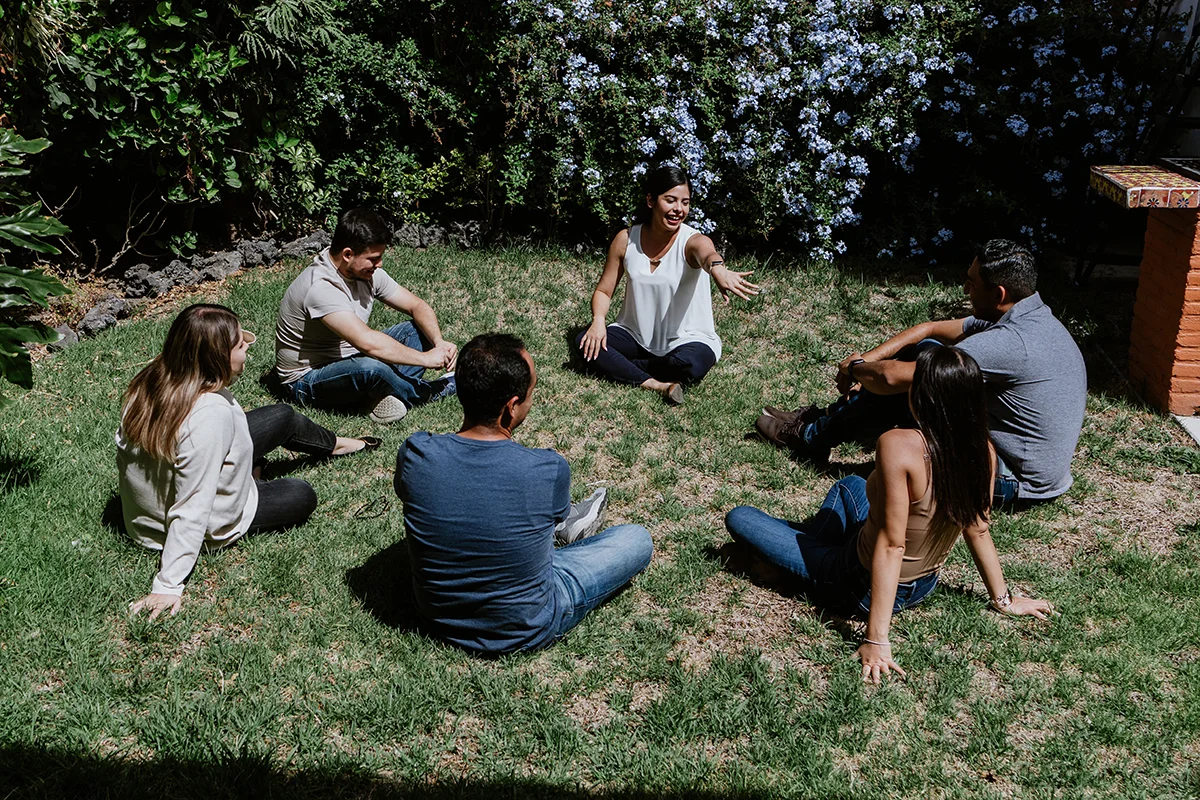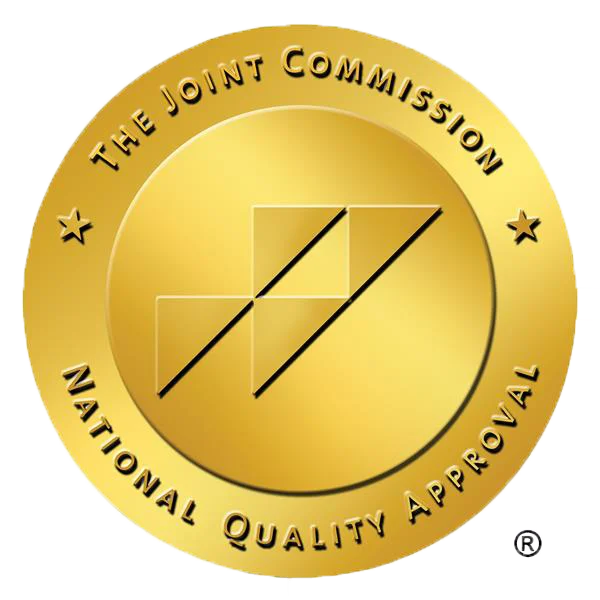At Olympia Grove Recovery, we believe healing happens when people feel respected and have a sense of accountability to themselves and one another. That’s why we offer high-quality group therapy services. Designed to support and empower our clients, our group therapy for addiction is one of the most powerful tools we offer. Evidence-based and professionally guided, group therapy is a safe space where clients build connections and make meaningful progress.
Group therapy is a core part of our residential addiction treatment programs and medical detox services. Combined with individual counseling and other addiction therapy programs, it creates a foundation for long-term recovery and a supported sober life.
Begin your path to recovery today
What is group therapy in addiction treatment?
Group therapy is a therapeutic approach where small groups of clients meet regularly with a licensed therapist. These sessions provide a safe, confidential space to explore challenges, develop new coping skills, and connect with others who understand what you’re going through.
At Olympia Grove Recovery, group therapy isn’t secondary to individual therapy or an optional feature. It’s an essential part of how we help clients rebuild their lives. Whether you’re just beginning detox or already immersed in inpatient care, you’ll experience a new level of growth when you join in conversation with those who get it.
How does group therapy support addiction recovery?
Addiction thrives in isolation. When you think you’re alone in any type of life struggle, it can be easy to get discouraged or feel shame. Group therapy breaks that isolation and replaces it with connection, perspective, and shared development.
During group therapy sessions, you’ll:
- Gain insight from people who’ve been through similar life scenarios
- Build accountability and mutual support for one another
- Practice communication, boundaries, and emotional regulation that will serve you long past treatment
- Replace shame with encouragement and self-compassion
In group therapy, you have a chance to give back to a community by sharing what you’re learning in treatment, while simultaneously being built up by others. That sense of purpose can be transformational.

Group therapy vs. AA: Which Is Right for Me?
This is a common question, especially for people unsure whether they need inpatient care.
While Alcoholics Anonymous (AA) and Narcotics Anonymous (NA) both offer powerful support, group therapy provides structured, professional help that addresses:
Co-occurring mental health concerns
While AA and NA give people the tools they need to get sober, therapy led by a licensed therapist will help you address many of the deeper issues that can lead to relapse when left untreated.
If you've tried AA and still feel stuck, you could be facing a more complex, layered issue. Olympia Grove Recovery’s inpatient program may be the right next step. Our team is equipped to work through any co-occurring mental health issues like post-traumatic stress disorder (PTSD), depression, anxiety, and more. Our goal for you is sustained recovery. Through individual and group therapy, we teach you skills that will last.
A closer examination of group therapy vs AA/NA
Weighing your options before enrolling in any program is wise. Understand the benefits of treatment and get the facts you need to make an informed decision. It’s one of the most important choices you’ll ever make.
Group therapy
- Led by licensed therapists
- Based on evidence-based therapeutic practices
- Confidential, structured format
- Part of a continuum of care including aftercare services
- Included during your inpatient stay
- Tailored for your unique mental health needs
- Equipped to address trauma
AA/NA meetings
- Led by peers
- Based on 12-step philosophy
- Spiritual focus
- Community support outside of treatment
- More general, less individualized support for addiction recovery
AA and NA can be helpful supplements to your sober life after treatment, but they aren’t a replacement for the structure and clinical guidance of professional therapy.
Types of group therapy used in rehab
There are a variety of group therapy types; each of them employing a different therapeutic approach based on client needs. Olympia Grove Recovery will consider your history and goals before determining which group is the best fit for you.
Here’s what you can expect:
- Psychoeducational groups: This type of group focuses on education around how addiction impacts the brain, preventing relapse, and the science behind recovery.
- Skills development groups: Practice skills you’ll need post-treatment. These include improved communication, emotion regulation, and stress management in a supportive space.
- Cognitive-behavioral therapy (CBT) based groups: These groups utilize CBT to help clients identify and reframe negative thought patterns.
- Support and process groups: Shared experiences are key here. In these groups, clients give and receive feedback from peers and have a safe space to express their emotions.
All of our groups are trauma-informed. This means our licensed therapists take special care to avoid retraumatization and provide a safe environment for your healing, regardless of group type or specific therapeutic approach.
Find out more about our addiction therapy programs
What to expect during group therapy
Group therapy may sound intimidating to some people, but it’s important to understand that you’ll never be forced to talk before you're ready. Most group therapy sessions include 6–12 participants and are led by a trained addiction therapist.
A typical group therapy session includes:
- A round of check-ins or emotional updates
- A focused topic like triggers, boundaries, or relationships
- Guided discussion or a therapeutic exercise
- Reflection and peer encouragement
Whether you're listening quietly or actively participating, you’re growing. We meet you where you are and gently encourage you to be as involved as you want to be.
What are the benefits of participating in group therapy?
While individual therapy allows clients to deep dive into their personal challenges and root causes of their substance use disorder, group therapy adds the dynamic of shared experience to your recovery journey. In group sessions you’ll gain not only professional guidance, but meaningful connection with others who have firsthand understanding of your struggle. The sense of community offered here is like no other, and the bonds formed can last long past formal treatment.
In group therapy you’ll feel less alone, gain new perspectives from other people’s stories and insights, and develop accountability by setting goals and celebrating the milestones of people who’ve become friends.
FAQs
No. We'll gently encourage you to participate when you feel ready, but listening is valuable too.
Yes. Our therapists enforce strict confidentiality, and clients agree to keep what’s shared during sessions private.
Common topics include cravings, boundaries, trauma, relationships, relapse prevention, and self-worth.
Sessions typically last 45 to 90 minutes and are offered multiple times per week.
Both. While in detox, sessions are there to provide gentle support. In residential, they become more interactive and therapeutic, getting you ready for life outside of treatment.
While we don’t provide outpatient care, we’ll supply you with aftercare resources and peer support groups in your area.
We understand. Our therapists are trained to support clients with social anxiety or trauma. You’ll never be pushed to speak before you’re ready.
Heal together, at Olympia Grove Recovery
At Olympia Grove Recovery, we believe that community is one of the most powerful tools in your recovery toolbox. Group therapy gives you the space to develop that, creating bonds with people who can walk the road of sobriety with you.
Whether you’re seeking inpatient treatment or exploring your options, we’re here to help you move forward—step by step, with structure, compassion, and real clinical support. Call 216.438.8351 today or submit our online form. We’ll connect with you soon.
